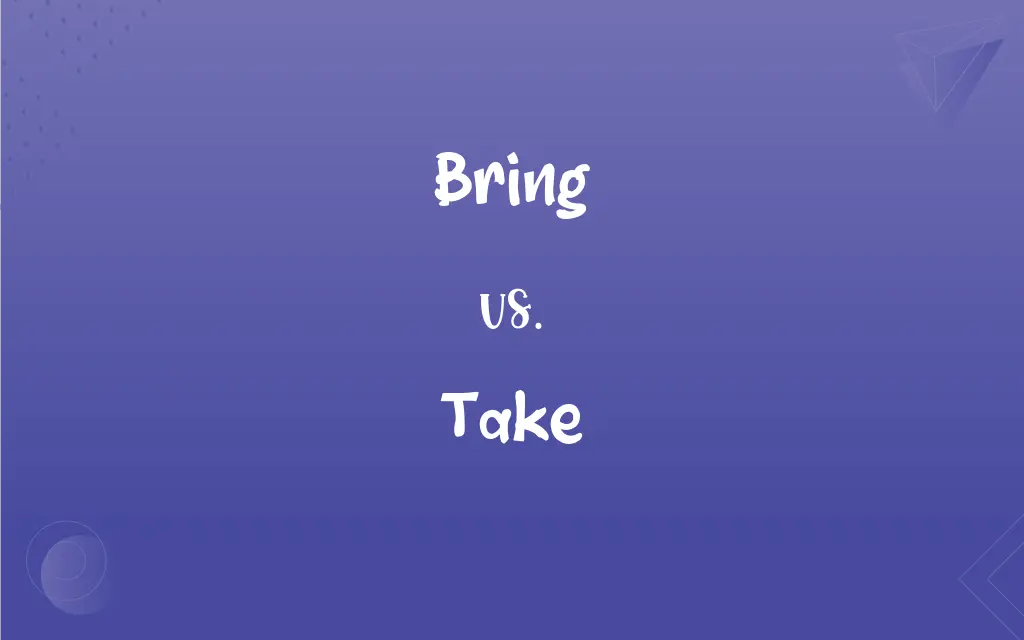Bring vs. Take: What's the Difference?
Edited by Janet White || By Harlon Moss || Published on November 21, 2023
"Bring" implies carrying something towards the speaker's location, while "take" means moving something away from the speaker or to another location.

Key Differences
Bring is used when the movement of an object or person is towards the speaker or the speaker's current location. For example, you ask someone to bring you a book when you are at home. Take, in contrast, is used when the movement is away from the speaker or to a different location. You take a book to school, meaning you move it away from your current location.
When using bring, the focus is on the arrival of someone or something to the speaker's place. It implies a movement towards the speaker. For instance, "Bring your report to my office" suggests bringing the report to where the speaker is. Take emphasizes the action of carrying or moving something from one place to another, away from the speaker. "Take your umbrella with you" means to carry the umbrella away from the current place, possibly where the speaker is.
Bring often involves a change in location towards a target place, usually where the speaker is or will be. It can also imply bringing something to a mutual or agreed location. On the other hand, take usually suggests transportation of something from the speaker's location to another, particularly emphasizing the act of removal or departure.
The use of bring and take also depends on the speaker's perspective. Bring is used from the perspective of the destination: "Can you bring some snacks to the party?" Here, the party is the destination. Conversely, take is used from the perspective of the starting point: "I'll take these snacks to the party," where the speaker's current location is the starting point.
In some contexts, bring and take can be interchangeable, especially in casual speech. However, the general rule remains: bring implies movement towards the speaker or a specific location, while take implies moving something away or to another place. Understanding this distinction helps in using these verbs accurately in different contexts.
ADVERTISEMENT
Comparison Chart
Direction of Movement
Towards speaker or destination
Away from speaker or starting point
Speaker's Perspective
Used when the object/person is coming to speaker’s location
Used when the object/person is going away from the speaker
Implication
Arrival at a target location
Departure or removal from a location
Typical Usage
Requesting someone to carry something to where the speaker is
Directing or describing the action of taking something away
Example
"Bring the files here."
"Take the files to the office."
ADVERTISEMENT
Bring and Take Definitions
Bring
To carry or come with something to a place.
Please bring your camera to the party.
Take
To choose or select something.
He will take the blue shirt over the red one.
Bring
To cause or persuade someone to come.
She will bring her friend to the meeting.
Take
To accept or receive something.
He decided to take the job offer.
Bring
To initiate legal action against someone.
The company decided to bring a lawsuit against the competitor.
Take
To move or carry someone or something from one place to another.
Please take these books to the library.
Bring
To cause something to be in a particular condition or state.
This news will bring joy to everyone.
Take
To remove something from a place.
Don't forget to take your umbrella when you leave.
Bring
To result in something happening or being caused.
Carelessness can bring accidents.
Take
To consume something, like food or medicine.
She needs to take her medicine twice a day.
Bring
To carry, convey, lead, or cause to go along to another place
Brought enough money with me.
Take
To grasp or grip
Take your partner's hand.
Bring
To carry as an attribute or contribution
You bring many years of experience to your new post.
Take
To capture physically; seize
Take an enemy fortress.
Bring
To lead or force into a specified state, situation, or location
Bring the water to a boil.
Brought the meeting to a close.
Take
To seize with authority or legal right
The town took the land by eminent domain.
FAQs
Can bring and take be used interchangeably?
In casual speech, they are sometimes used interchangeably, but they have distinct meanings based on direction of movement.
Is take used in the context of departing?
Yes, take is used when something is being moved away from the speaker’s current location.
What does take mean?
Take means to carry or move something or someone from one place to another, away from the speaker or current location.
Is bring used in the context of arriving?
Yes, bring is used when something is being moved towards the speaker or a specific destination.
Can bring be used to mean cause something to happen?
Yes, bring can also mean to cause a particular condition or state, e.g., "bring happiness."
What is an example of using bring correctly?
"Can you bring your laptop to my house?" implies bringing the laptop to where the speaker is.
What is an example of using take correctly?
"I’ll take these documents to the office" implies moving the documents away from the current location.
Is bring used in legal context?
Yes, bring can mean to initiate legal action, e.g., "bring a lawsuit."
Does bring imply an action towards the speaker?
Yes, bring generally implies movement towards the speaker or their location.
What does bring mean?
Bring means to carry or lead something or someone towards a destination or the speaker.
How does perspective affect the use of bring and take?
Bring is used from the destination’s perspective, while take is used from the starting point’s perspective.
Does take imply an action away from the speaker?
Yes, take typically implies movement away from the speaker’s current location.
How does bring relate to arrival?
Bring is associated with someone or something arriving at the speaker’s location or a destination.
Is take used in the context of accepting something?
Yes, take can mean to accept or receive something, e.g., "take an offer."
Can take be used in the context of consumption?
Yes, take is often used to describe consuming something, e.g., "take medicine."
What is an example where bring and take are used in the same context?
"Bring me the book from the table, then take it to the library" uses both in context.
Can take be used to mean choosing something?
Yes, take can mean to choose or select, e.g., "take the best option."
How does take relate to departure?
Take is associated with moving something away from where the speaker is, emphasizing departure.
In what scenarios are bring and take most accurately used?
Bring is accurate when referring to movement towards, and take when referring to movement away.
Can bring be used to request someone’s presence?
Yes, bring can be used to request someone to come along, e.g., "bring your friend."
About Author
Written by
Harlon MossHarlon is a seasoned quality moderator and accomplished content writer for Difference Wiki. An alumnus of the prestigious University of California, he earned his degree in Computer Science. Leveraging his academic background, Harlon brings a meticulous and informed perspective to his work, ensuring content accuracy and excellence.
Edited by
Janet WhiteJanet White has been an esteemed writer and blogger for Difference Wiki. Holding a Master's degree in Science and Medical Journalism from the prestigious Boston University, she has consistently demonstrated her expertise and passion for her field. When she's not immersed in her work, Janet relishes her time exercising, delving into a good book, and cherishing moments with friends and family.






































































